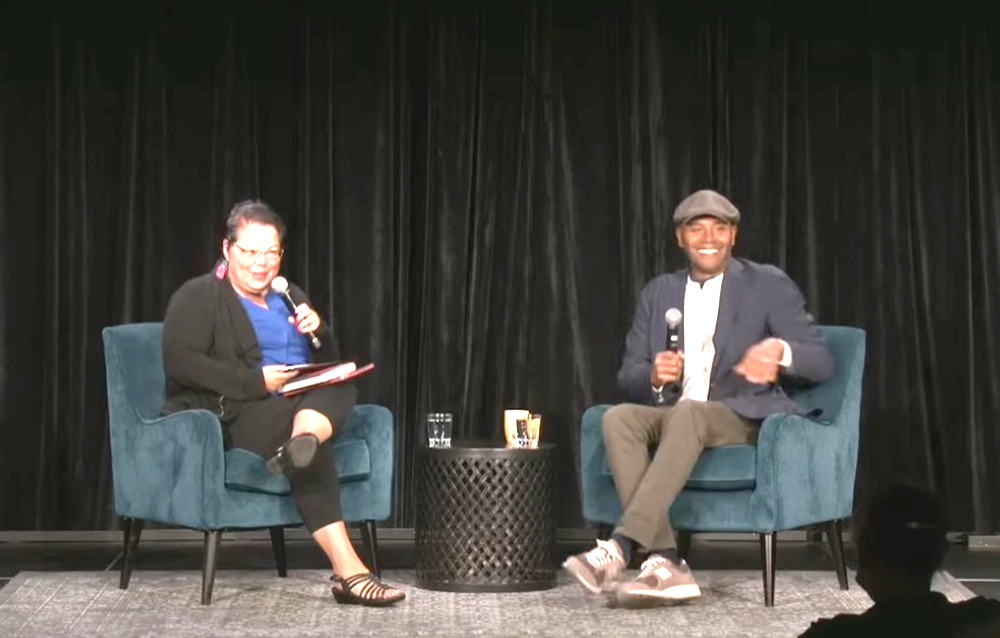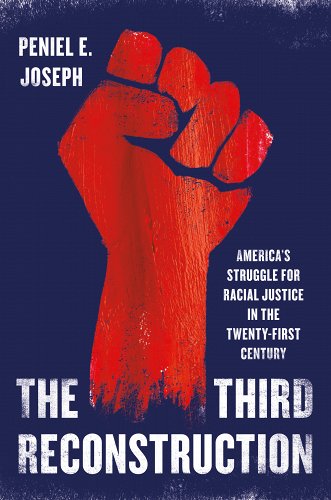By Kai Curry
Northwest Asian Weekly

Naomi Ishisaka (left) moderates the conversation with Peniel E. Joseph.
“I’m a big advocate of talking about hard history…We have to talk about the bitter and the beautiful. The only way you get to love your country is when your country loves you back…part of that reciprocal relationship is finding out the truth of the country and why these unhappy patterns of discrimination and inequality continue to persist, for all of us,” said Peniel E. Joseph, author of “The Third Reconstruction: America’s Struggle for Racial Justice in the Twenty-First Century,” just released in September, and guest of Seattle’s Town Hall on Sept. 15.
Joseph is the author and editor of several books relating to Black history, a frequent contributor on CNN, and a contributing writer for national newspapers. In this recent book, which he described as a “blend of memoir, history, and cultural and political criticism,” he discusses the power of narrative and his concept of three reconstruction periods in United States’ history, throughout which reconstructionists and redemptionists battle to win this narrative.

The first reconstruction we read about in history class. It followed the Civil War and was comprised of “years of pain and hope in the aftermath of racial slavery, the reconstruction amendments, birthright citizenship, the end of slavery, voting rights for Black men, and really, the hope and promise of multiracial democracy, of reconstructionism,” explained Joseph. These efforts were “pushed back” by redemptionists, who are advocates of white supremacy.
The second reconstruction encompasses the Civil Rights movement, when “the world was on fire in America because of institutional and structural racism.” There are highlights, i.e. freedom summers and the founding of the Student Nonviolent Coordinating Committee, which Peniel deems “the most important grassroots civil rights organization of the 20th century,” and there are tragedies like the lynching of Emmitt Till and the assassination of Martin Luther King, Jr.
The third reconstruction is happening today. It’s the election of Barack Obama and the election of Donald Trump. It’s Black Lives Matter (BLM) and Make America Great Again. It’s the murders of George Floyd and Trayvon Martin.
“Everything that happens in 2020, all the way to the present…when it was happening, people kept talking about the 1960s…We should be looking at the 1860s…for us to really understand what’s happening,” Joseph told event moderator, Naomi Ishisaka, Seattle Times columnist known for her social justice angle.
All of the events in this timeline are part of our narrative, of the stories we tell. We want to tell ourselves a story about democracy, but the fact is that democracy in the United States “has always been an aspirational idea,” according to Joseph. It’s a democracy where anyone that is not a white male is told, “You don’t deserve to be at the center of our American story.”
For Joseph, the prerequisite for citizenship is dignity. “All of us have to believe that we matter,” but “not everybody’s family even recognizes their own dignity.”
Joseph’s democracy includes dignity and citizenship for women of all colors, for the disabled, for queer and trans. “We have to remember that every single person born, whether they’re an American or not, has dignity.”
In response to Ishisaka’s curated questions and those from the audience, Joseph elaborated that race is not necessarily a factor in whether a person is redemptionist or reconstructionist.
“Some of the staunchest reconstructionists are white people. Some of the staunchest redemptionists are Black people, including one on the Supreme Court!” And each group has its own spectrum. Barack Obama, Joseph considers a reconstructionist, with a redemptionist bent. Yes, his presidency finally presented to the rest of the world an American face, and a first family, that was not white, but at the same time, Obama “smoothed over the rough parts of our history at the expense of a reckoning that we needed to really become the country we’ve always wanted to be…free of racial inequality and economic injustice and discrimination and violence.”
Joseph spoke of the differences between the BLM movement and Obama—how Obama could not have imagined Trump as president, Joseph believes, but BLM could—“they had a deeper understanding of the country than the president.”
For Joseph, achieving equal dignity and equal citizenship requires a courage of conviction that he attributes, especially to Black women. It requires widening what counts as our universal stories to include those of indigenous groups, Asians and Pacific Islanders, Latinx, and the LGBTQ community. To him, white supremacy is “a story we tell ourselves, just like Black liberation…the Chicano movement, Asian American Pacific Islander liberation…You can tell a story about America where you center Dolores Huerta” or Fannie Lou Hamer, who famously said, “Until I am free, you are not free, either.”
When asked how to combat the “fragmentation” of social media, of everyone “feeding themselves their own food,” Joseph advocated for more public broadcasting and the return of the equal time doctrine, “so if you hear from a progressive person, you’re going to have to hear from a conservative person.” He advocated that political campaigns be 100% publicly financed and that senators and Supreme Court justices be subject to a term limit. Saying that today, we are like the Gilded Age, when the rich exploited Chinese and Black labor to build railroads, he insisted that we “have to think about stopping monopoly capital and the oligarchy.”
Joseph acknowledged that local activism can be challenging, when people of color might view liberal whites as performative allies and “don’t necessarily think of [them] as standing in solidarity.” He noted that, in Austin, Texas, where he lives and teaches, and in Seattle, too, what we should be doing is elevating and leveraging “the Black-led and women-led, Asian- and Latinx-led, indigenous-led, nonprofits, anti-racist, and social justice organizations.” We should be making everyone feel visible and valued. “Men should be doing it vis-à-vis women. Straight people should be doing it vis-à-vis queer folks and trans folks. There’s a lot that we all should be doing if we really want to build a beloved community.”
Ronald Reagan called the United States “a shining city upon a hill” but we’re not there yet, not in everyone’s narrative but only the narrative of some. “If we can tell a different story, where we’re not so caught up in our ego and our vanity as Americans,” Joseph said, then maybe we can achieve true multiracial democracy. “People want a story where they see themselves in it.”
Kai can be reached at info@nwasianweekly.com.

